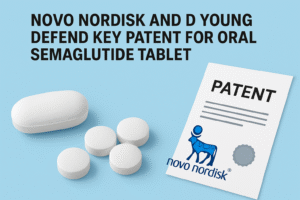Indian pharmaceutical major Dr. Reddy’s Laboratories has mounted a significant legal challenge against Novo Nordisk’s patent for semaglutide, the key ingredient in its blockbuster weight-loss and diabetes drug Ozempic, potentially opening the door for affordable generics in India and other emerging markets.
Filed in the Delhi High Court, the challenge targets Novo’s secondary patent on semaglutide (filed in 2007 and expiring in 2026), which Dr. Reddy’s argues lacks inventive merit and violates Section 3(d) of the Indian Patent Act — a clause designed to prevent “evergreening” or unjustified patent extensions.
Patent Dispute and Court Proceedings
Novo Nordisk, the Danish pharmaceutical giant, responded with legal action of its own, securing an interim injunction from the Delhi High Court against Dr. Reddy’s and its partner OneSource. The court has temporarily restrained the companies from selling semaglutide-based formulations in India. However, it has allowed them to manufacture and export the drug while the case is pending.
The next hearing is scheduled for August 19, 2025.
Semaglutide: The New Blockbuster Molecule
Semaglutide, a GLP-1 receptor agonist, is used under brand names like Ozempic, Wegovy, and Rybelsus to treat type 2 diabetes and obesity. The drug has surged in popularity due to its effectiveness in weight management, contributing to a global market exceeding $29 billion annually.
With India projected to have over 450 million overweight or obese individuals by 2050, the demand for such therapeutics is expected to skyrocket.
Currently, a monthly course of semaglutide via Rybelsus (oral tablets) costs around ₹10,000, while injectable alternatives such as Mounjaro (from Eli Lilly) are priced at approximately ₹17,500. If generics are approved post-patent expiry, prices could drop by 60–70%, making treatment accessible to a broader population.
Indian Pharma Eyes Generics Boom
Besides Dr. Reddy’s, companies like Cipla, Sun Pharma, Biocon, and Lupin are believed to be preparing for post-2026 launches of generic semaglutide. Some have reportedly begun exporting to countries where Novo’s patent has already expired or been challenged successfully, such as Canada, Russia, and certain Latin American markets.
This development mirrors a global trend where generic manufacturers are seizing opportunities to introduce affordable alternatives amid the soaring demand for anti-obesity medications.
Legal and Market Implications
Dr. Reddy’s legal move could set a powerful precedent. If successful, it would significantly reduce time-to-market for semaglutide generics in India, giving Indian pharmaceutical firms a competitive edge globally and delivering cost-effective options domestically.
The case also underscores the growing tension between intellectual property rights and public health interests, particularly in the post-pandemic pharmaceutical landscape where access to essential medications is a national and humanitarian priority.
What’s Next?
August 19, 2025: Delhi High Court hearing on Novo Nordisk’s injunction.
March 2026: Scheduled expiry of Novo Nordisk’s secondary semaglutide patent.
Post-2026: Potential for a flood of semaglutide generics if the patent is invalidated or expires without further extension.
This article is based on publicly available information and legal filings as of June 21, 2025. It is intended for informational purposes only and does not constitute medical or legal advice. Readers are advised to consult healthcare professionals or legal experts for specific concerns. All trademarks, brand names, and company names are the property of their respective owners.




